3. Have you made several hypotheses?
2020/11/12 Elhuyar Zientzia
 400
400
Importance of the analysis of the different hypotheses
When we want to understand or explain something, it is very important to know that there can be many ways to argue what we want to explain or understand, that is, we must think of different hypotheses. The following will be analyzed the forms of systematic demonstration and elimination of each of these hypotheses (scientific method). Thus, the hypothesis that has not been eliminated between these working hypotheses is more likely to have a correct explanation than if we had simply chosen the hypothesis that had been raised in the first hypothesis.
When proposing the hypotheses, it is very important to inquire about what we want to understand or explain. The more we know of something, the easier it will be to pose different hypotheses and reject erroneous ideas or hypotheses that come to mind.
Scientists are used to working with different hypotheses, but how does the analysis of the different hypotheses influence our day to day? To give credibility to an information we have, it is advisable to analyze what is argued and see if there are other ways to explain. That is, check if it is possible to explain it in another way.
When a critical thinker receives information, he will think if the information can be explained otherwise what is stated (if there are other hypotheses) and contrast the information received. In addition, in the decisions to be made on a daily basis, it will reflect on the possible responses or consequences of such decisions, that is, it will take into account the consequences that may derive from the decisions to be made.
We will recover the example of the challenge of the chair previously used to explain what was said in the previous paragraphs of this point: in the initial approach of the challenge of the chair it is defended that the challenge can only be assumed by women, that is the hypothesis. But we have seen that the ability to complete it has nothing to do with gender, but with the characteristics of each person's body. To reach this conclusion, we have analysed the challenge, analysed the information on the subject, proposed a new hypothesis and, through experimentation, we have confirmed the hypothesis. If we had believed the first hypothesis, we would be wrong and run the risk of becoming accomplices to expand a claim that is not true.
You do not insist on defending your own hypothesis
Normally we tend to think that the hypothesis or argument itself is the best. But the hypothesis or reasoning itself does not mean that it is real, but must be demonstrated with evidence. It is very important, therefore, to question one's own hypothesis or argument and analyze it as if it were another: to seek reasons of rejection, to compare with other alternatives, etc.
A critical thinker, just as he rejects rumors and deceptions, will try to keep others from making their own mistakes by trying to be the reason at all costs. Thus, before giving your opinion on a topic, you will make a profound reflection on what you should say, taking into account the views and opinions of others.
Possible cancellation of hypothesis / Falsability of hypothesis
The independent confirmation of the facts is one of the bases of the scientific method, since the falsability or annulability of a theory (or hypothesis) is the other fundamental base.
According to this, any scientific proposition must be refuted. That is, the scientific method rejects absolute truths, so that scientific propositions can never be considered absolutely true, but “not falsified”.
But this not only happens with scientific propositions. In the debates that may arise in the day to day of anyone, no one has absolute truth and it must be clear that the opinion of anyone can be revoked. When annulling someone's argument, a counterargument should be used to show that the thesis or idea indicated is incorrect or false. The counter-arguments used to override an idea or argument, to be credible, must be based on evidence and also be annulable.
A critical thinker, therefore, by rejecting an affirmation of another person or the arguments he uses for his defense, will use evidence-based counter-arguments. He will explain the counterarguments with respect and understandably, without ridiculing anyone and without showing false piety; otherwise, even if he has no reason, he can reject the exhibition in opposition.
For all that is mentioned in this section, the importance of hypotheses, not only in science and scientific method, but also in our daily life, is indisputable.
To download the document click here.




